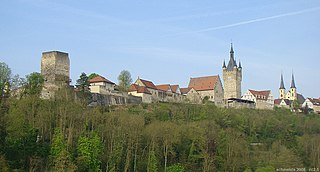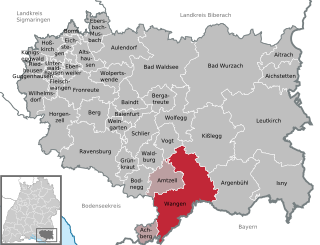 W
WThe Swabian League was a mutual defence and peace keeping association of Imperial Estates – free Imperial cities, prelates, principalities and knights – principally in the territory of the early medieval stem duchy of Swabia established in 1488.
 W
WBad Wimpfen (help·info) is a historic spa town in the district of Heilbronn in the Baden-Württemberg region of southern Germany. It lies north of the city of Heilbronn, on the river Neckar.
 W
WThe Duchy of Württemberg was a duchy located in the south-western part of the Holy Roman Empire. It was a member of the Holy Roman Empire from 1495 to 1806. The dukedom's long survival for nearly four centuries was mainly due to its size, being larger than its immediate neighbors. During the Protestant Reformation, Württemberg faced great pressure from the Holy Roman Empire to remain a member. Württemberg resisted repeated French invasions in the 17th and 18th centuries. Württemberg was directly in the path of French and Austrian armies who were engaged in the long rivalry between the House of Bourbon and the House of Habsburg. In 1803, Napoleon raised the duchy to be the Electorate of Württemberg of the Holy Roman Empire. On 1 January 1806, the last Elector assumed the title of King of Württemberg. Later that year, on 6 August 1806, the last Emperor, Francis II, abolished the Holy Roman Empire.
 W
WThe Free Imperial City of Ulm was a Free Imperial City of the Holy Roman Empire. It is situated on the left bank of the Danube, in a fertile plain at the foot of the Swabian Jura.
 W
WGiengen is a former Free Imperial City in eastern Baden-Württemberg near the border with Bavaria in southern Germany. The town is located in the district of Heidenheim at the eastern edge of the Swabian Alb, about 30 kilometers northeast of Ulm on the Brenz River.
 W
WHeilbronn is a city in northern Baden-Württemberg, Germany. It is surrounded by Heilbronn District and, with approximately 123,000 residents, it is the sixth-largest city in the state.
 W
WWeil der Stadt is a town of about 19,000 inhabitants in the Stuttgart Region of the German state of Baden-Württemberg. It is about 30 km (19 mi) west of Stuttgart city centre, in the valley of the River Würm, and is often called the "Gate to the Black Forest".
 W
WIsny im Allgäu is a town in south-eastern Baden-Württemberg, Germany. It is part of the district of Ravensburg, in the western, Württembergish part of the Allgäu region.
 W
WKaufbeuren is an independent town in the Regierungsbezirk of Swabia, Bavaria. The town is completely enclaved within the district of Ostallgäu.
 W
WThe Margraviate of Baden was a historical territory of the Holy Roman Empire. Spread along the east side of the Upper Rhine River in southwestern Germany, it was named a margraviate in 1112 and existed until 1535, when it was split into the two margraviates of Baden-Durlach and Baden-Baden. The two parts were reunited in 1771 under Margrave Charles Frederick. The restored Margraviate of Baden was elevated to the status of electorate in 1803. In 1806, the Electorate of Baden, receiving territorial additions, became the Grand Duchy of Baden. The rulers of Baden, known as the House of Baden, were a cadet line of the Swabian House of Zähringen.
 W
WÜberlingen is a German city on the northern shore of Lake Constance (Bodensee) near the border with Switzerland. After the city of Friedrichshafen, it is the second largest city in the Bodenseekreis (district), and a central point for the outlying communities. Since 1 January 1993, Überlingen has been categorized as a large district city.
 W
WWangen im Allgäu is a historic city in southeast Baden-Württemberg, Germany. It lies north-east of Lake Constance in the Westallgäu. It is the second-largest city in the Ravensburg district and is a nexus for the surrounding communities. From 1938 to 1972, Wangen was the county seat of the Wangen rural district.